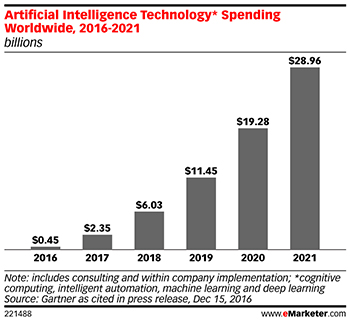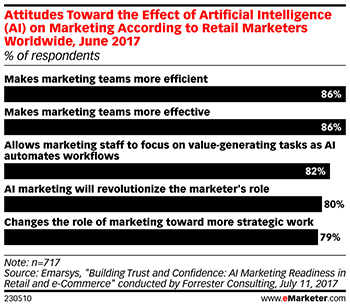Additionally, spending on artificial intelligence technology is expected to increase significantly over the next few years, approaching $30 billion dollars by 2021. With Customer Experience being a critical differentiator for brands in every industry, understanding and utilizing AI correctly to drive data analysis and insights has become a necessity for brands.

Understanding Artificial Intelligence
Today, most competing Companies rely on AI to optimize marketing initiatives, ultimately improving the customer experience. For example, companies traditionally use AI to:
- Automatically bid on ad-space and learn hidden rules to optimize ad visibility.
- Better serve customers by driving struggling customers to customer service representatives or an online chat.
- For example, companies can use AI to run and design optimizations, developing new features by allowing software to choose when and how to run experiments.
- Sift through mountains of data, automatically generating both visuals and prose.
So how does AI actually work? When viewed from a high level, AI is simply a sub-field of computer science focused on the creation of intelligent machines that imitate human intelligence. This includes basic activities such as speech recognition and problem-solving. To help better understand how AI works, let’s utilize a simple peanut butter & jelly sandwich, because it doesn’t get much simpler than that!
At the basic level, if we wanted to teach a technological machine to make a peanut butter & jelly sandwich, we would write code to have the software “make a peanut butter and jelly sandwich.” We would start by creating rules for the machine to take two slices of bread, take a knife out of the drawer, spread the peanut butter and jelly, and place the two slices together. In contrast, if we were to “teach” our AI software to do the same task, we might code some basic functionality in this way, but attempt to “teach” the system to make the sandwich by abiding by these rules.
Should I use Artificial Intelligence?
Simply put, AI is an extremely powerful tool when used appropriately and responsibly that can benefit a wide variety of brands across every industry in a variety of ways. While AI is not an ideal solution for all companies and solutions, embracing AI technology can many leading brands achieve both their business and marketing goals.
That’s not to say that AI is for every organization and companies should not invest in AI to only solve simple problems. It’s true that simpler problems with straight-forward rules can be solved with AI, no problem. However, the complexity of constructing AI can increase costs and simpler problems typically do not merit such an investment. To go back to the peanut butter and jelly sandwich, teaching a simple AI task could be an immense undertaking, and therefore organizations would be wise to simply make the sandwich themselves, rather than utilize AI.

Each organization is different and, in many cases, embracing AI can have a significant effect on your marketing team. Take, for example, the eMarketer survey of retail industry marketers from last year. More than four of every five respondents felt that the effect of AI helped make their marketing teams more efficient and effective while also allowing them to focus on value-generating tasks and more strategic work.
AI is an incredibly powerful tool when set up and utilized effectively that can help leading brands differentiate themselves from their competition. Like any technology though, an in-depth understanding of AI is necessary to fully realize its potential.
Utilizing Artificial Intelligence Responsibly
Like any powerful technology, the potential to misuse AI should give organizations pause before employing them to solve problems. Some of the risks include malevolent repurposing of existing AI systems, job displacement in favor of AI, and privacy concerns as a result of the large number of data sets input into an AI. With GDPR right around the corner, the privacy concerns around the significant amount of disparate datasets needed to effectively leverage AI have taken on added significance.
Want to learn more about utilizing AI effectively and how it could help your company? Ask our expert team a question by emailing us at info.US@ebiquity.com.
Like this article? To get insights like these delivered to your inbox, as well as the latest industry updates, subscribe to our Monthly Newsletter using the form below!



